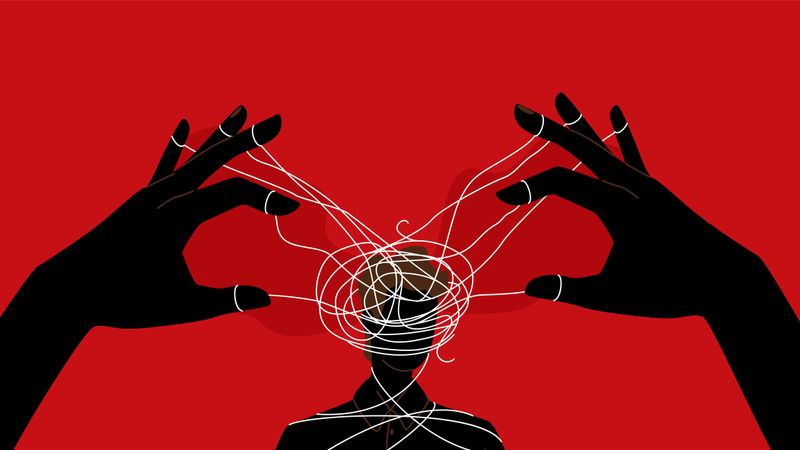Not all narcissists are loud, arrogant, or obviously cruel. Some of them are incredibly nice—on the surface. They’re generous. Charming. Helpful. Compliment-filled. The kind of person others adore.
But behind the kindness? Manipulation, control, and ego are quietly doing the talking. Because narcissists don’t always destroy with rage—they disarm with “niceness.”
Ecco 16 subtle signs someone’s kindness is actually a narcissistic mask.
1. They’re nice to everyone—except the people closest to them
Strangers get charm. You get criticism, gaslighting, or silence. It’s like living with a chameleon. They shift from sweet to sour, depending on who’s watching. Ever notice how their smile fades when the door closes? It’s not your imagination. The warmth drops, and you’re left in the cold. It’s a subtle shift, but it speaks volumes.
When they’re in public, they’re the life of the party. At home, the mask slips, revealing a more sinister side. It’s not about you; it’s about maintaining appearances. Keep your eyes open, because that charm isn’t for you – it’s for the audience.
2. They need to be seen as “the good one.”
Every good deed is done loudly—and they need recognition for it. It’s like a show with one star. You see them collecting accolades like trophies, but there’s no substance behind the display. Why the performance? Validation is their lifeline. Without it, their facade cracks.
They’re addicted to the applause, the praise, the title of ‘the good one.’ But it’s not about being good; it’s about being seen as good. If you’ve ever felt used as a prop in their play, you’re not alone. It’s exhausting, isn’t it? Remember, it’s all about them, not the good they claim to do.
3. Their kindness comes with strings attached.
They’ll help you, sure. But you’ll owe them later—emotionally or otherwise. It’s never free. Picture it: a gift given, but with invisible threads. You feel it tugging, pulling you into obligations you never agreed to. When kindness becomes a bargaining chip, it’s no longer about you. It’s about control.
You’re stuck in this cycle of give and take, but mostly take. Ever felt like a pawn in their game? That’s the catch – their generosity isn’t from the heart; it’s a tool. Stay wary. Understand that real kindness doesn’t demand repayment.
4. They give compliments that subtly put you down.
“You actually look nice today!” Translation: You usually don’t. It’s a jab wrapped in sweetness. Have you felt the sting? These remarks are designed to keep you off balance, questioning your worth. It’s subtle, but the impact is real. That’s the trick – they sound almost sincere. But listen closely.
Each ‘compliment’ is a critique in disguise. It’s tiring, feeling like you’re always defending yourself. Over time, these little barbs add up. The mask slips further, revealing the insecurity underneath. Remember, you deserve genuine praise, not hidden daggers.
5. They weaponize their generosity.
“After all I’ve done for you…” is their favorite guilt trip. Every act of ‘kindness’ becomes ammunition. It’s an emotional debt collector’s dream. Can you feel the weight of it? They tally each favor, ready to throw it back at you. Their generosity isn’t selfless; it’s strategic.
You’re cornered, manipulated into submission by their so-called goodwill. It’s exhausting, isn’t it? Feeling like you owe them forever. But here’s the truth: real generosity doesn’t demand payback. Next time they try to weaponize their giving, remember, your worth isn’t tied to their ledger.
6. They’re only nice when people are watching.
Behind closed doors, the warmth vanishes. It’s like flipping a switch. Ever feel the chill when the audience leaves? Public niceness is their mask, but in private, indifference reigns. You’re not imagining it. The charm is reserved for others. At home, it’s a stark contrast. The transformation is almost theatrical, isn’t it?
But there’s no clapping here, just solitude. When the facade drops, you see the real them – uninterested in connection unless it’s performative. It’s a lonely place, this reality behind closed doors. Keep your eyes open, and trust what you see when the lights dim.
7. They call you ungrateful when you set boundaries.
Because your limits threaten their image of themselves as endlessly giving. Ever been painted as the villain for saying ‘no’? It’s a common tactic. They twist your boundaries into betrayals. It’s not just frustrating; it’s isolating. You’re made to feel guilty for protecting yourself.
But here’s the kicker: boundaries aren’t about them. They’re about you. In their narrative, though, you’re the ungrateful one. It’s a manipulation play, designed to keep you compliant. But stand firm. You deserve to be respected, and your boundaries aren’t up for debate.
8. They bring up their “niceness” constantly.
If someone keeps telling you how good they are… pay attention to why they need to say it. It’s like a broken record, isn’t it? You hear it over and over again. But why the need to advertise? It’s a cover, a deflection from their true nature. Real kindness speaks for itself; it doesn’t need a microphone.
Ever notice how they slip it into every conversation? It’s exhausting, isn’t it? But listen carefully. The louder they proclaim their niceness, the more you should question it. Genuine actions need no announcement. Trust what’s unsaid.
9. They “rescue” others to feel important—not to actually help.
They’re addicted to being needed—but resent you if you rely on them. It’s a savior complex in action. Ever feel like a project? Their ‘help’ isn’t about you; it’s about their ego. You’re a means to an end, a tool for their self-esteem. But if you lean too hard, the resentment creeps in. It’s a paradox, isn’t it?
Needed, yet they despise the very reliance they foster. You’re left walking a tightrope. Understanding this dynamic is key. They’re not rescuing you; they’re rescuing their image. Your independence is your power, so hold onto it.
10. They twist kindness into control.
“I’m just trying to help” becomes an excuse to override your autonomy. Have you felt smothered by their so-called assistance? It’s not help; it’s a leash. Their ‘kindness’ is a way to bind you, to keep you in check. It’s cloaked in concern, making it harder to refuse. You’re left questioning, doubting your own needs.
But the reality is: true help empowers you, not controls you. Have you felt like you’re losing yourself in their shadow? It’s a subtle suffocation. Remember, your independence isn’t negotiable. See through the facade, and reclaim your space.
11. They expect special treatment in return for basic decency.
Being respectful isn’t a favor—it’s the floor, not the ceiling. Ever felt like you’re living in their debt? Their demands for gratitude are relentless. Basic decency isn’t charity, and yet, they expect a parade. It’s exhausting, isn’t it? The constant pressure to acknowledge their every move.
Have you questioned why something so fundamental needs applause? It’s a red flag, a peek behind the curtain. You’re not ungrateful; you’re aware. Real respect doesn’t come with conditions. Stand your ground, and let them know that you see through their game. Your dignity isn’t up for negotiation.
12. They love being seen as the victim if they’re ever confronted.
The second you push back? “I can’t believe you’d treat me like this after everything.” It’s a dramatic flip, isn’t it? Suddenly, they’re the wounded party. You’re the villain in their story. It’s a manipulation tactic, making you question your actions. Ever felt like you’re in a never-ending play?
Their victimhood is their shield, deflecting blame. But here’s the truth: standing up for yourself isn’t cruel. It’s necessary. They may try to rewrite the narrative, but you know your truth. Don’t let the theatrics sway you. Keep your boundaries intact, and remember your worth.
13. They overgive in the beginning, then withdraw to punish you.
Love-bombing shifts into cold detachment the moment you stop idealizing them. Have you felt the chill? The initial warmth was intoxicating. You were swept up, weren’t you? But then, the cold shoulder hits. It’s a calculated move. Their affection was never unconditional; it was a test.
Once you’re no longer useful, the warmth retracts, leaving you questioning everything. It’s a cycle designed to control, to keep you on your toes. But here’s the reality: you deserve consistency, not games. Recognize the pattern, and break free. Your peace isn’t a tool for their manipulation.
14. They act like they know what’s best for you—always.
But their “advice” feels more like dominance than care. Have you felt belittled by their guidance? It’s not about your best interest. It’s about control, about asserting superiority. You’re left feeling small, questioning your choices. Their words are cloaked in care, but the power play is evident.
Ever wonder why their advice feels like a command? It’s not support; it’s control. But your life is yours to live. Stand firm, and trust your instincts. You know what’s best for you. Their dominance is their problem, not yours. Embrace your independence, and don’t let their façade dictate your path.
15. They don’t respect your “no”—they just reframe it.
They’ll sweet-talk, guilt, or manipulate you into saying yes anyway. Have you been pressured into compliance? It’s a subtle art, their ability to bend your will. Your ‘no’ is just a challenge to them, a hurdle they delight in overcoming. It’s not respect; it’s a game. You ever feel like your boundaries are paper-thin?
They see them as temporary roadblocks. But here’s the reality: No means no. Stand firm in your convictions. Your voice matters, and it’s not up for negotiation. Let them know that your boundaries are set in stone, not sand.
16. Their kindness disappears when you stop feeding their ego.
If you don’t admire, obey, or praise them constantly… the mask cracks. Have you seen their demeanor shift? The kindness evaporates, replaced by indifference. It’s not kindness; it’s a transaction. You stop feeding their ego, and they lose interest. Ever feel like a supplier for their self-worth?
When the admiration stops, so does their ‘kindness.’ It’s revealing, isn’t it? The relationship becomes a mirror, reflecting their true intentions. But here’s the truth: You’re not responsible for their ego. Your value isn’t tied to their whims. Stand tall, and know that your worth isn’t dependent on their approval.

















